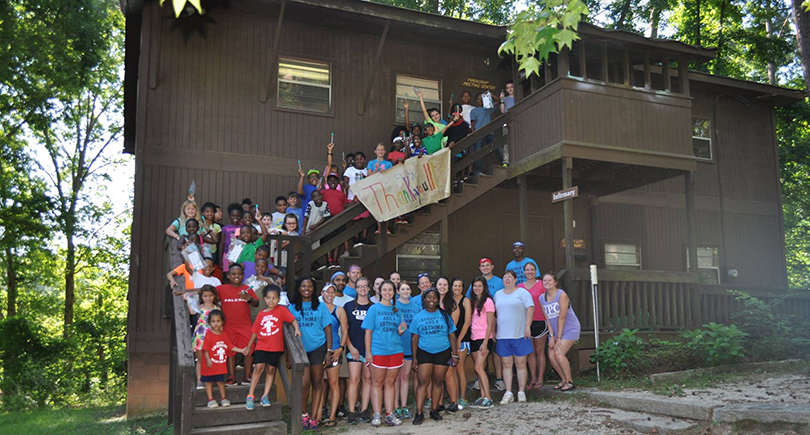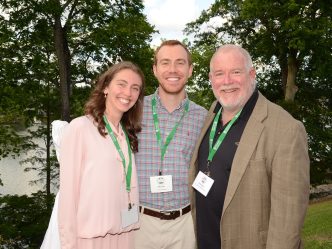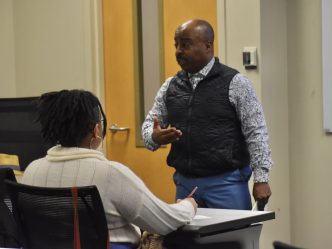What do gold medalist swimmer Kelsi Worrell and legendary track and field star Jackie Joyner-Kersee have in common?
If asthma wasn’t your first thought, you’re not alone. For centuries, the chronic inflammatory disease – often seen as a limiting factor to exercise and physical fitness – has been viewed as a disability. Today, roughly 8 percent of Americans – around 25 million people – suffer from asthma, and that same percentage holds true even among the world’s most elite athletes. Those figures beg an important question:
How did a disease so prevalent earn such a negative stigma?
Blame it on a lack of education. So says Dr. Kitty Hernlen, associate professor of respiratory therapy and director of the annual Augusta University Asthma Day Camp.
“Asthma isn’t a limiting factor for exercise or physical fitness today because we have the medication to treat and manage it,” she said. “Asthmatic children should be no different than anyone else when it comes to physical activity.”
That’s the ultimate takeaway of the university’s day camp. Started in 2012, the free weeklong camp provides a safe, educational space for local children suffering from asthma to learn more about treating and, more importantly, managing their disease. This year, the camp attracted dozens of local children with asthma, a success Hernlen attributes in part to the positive message campers take away from their experience.
“We teach them about their asthma and how to manage it with medication and monitoring, but we are also there as a regular camp,” Hernlen said. “That allows the kids to do physical activities under the guidance of respiratory therapy students, faculty and nurse volunteers, and it also gives them a chance to see that they can do whatever they want as long as their asthma is managed properly.”
In addition to learning about the anatomy of the lungs, children are taught how to use peak flow meters – handheld devices that measure how well air exits the lungs – and holding chambers –inhaler attachments that trap and hold asthma medication once dispensed, allowing it to be breathed in slowly.
Hernlen said campers enjoy learning how to manage their disease, but that they enjoy another aspect of camp even more. Swimming.
“It’s good physical activity,” said Dr. Gina Besenyi, assistant professor in the Department of Clinical and Digital Health Sciences and director of the Physical Activity Research in Community Settings Lab (PARCS). “Even for the kids who weren’t the best swimmers, it didn’t slow them down a bit.”
Besenyi, whose research into active living behaviors contains a strong community focus, said that beyond providing a satisfying camp experience for local children, the asthma day camp was also a great opportunity for community health research.
“This year, we had a component where we gave the children surveys to see if they were learning,” she said. “But we also asked the parents some questions about whether they felt like their child’s asthma was controlled more.”
Although the results of the surveys are still pending, Bisenyi said she and Hernlen have already gotten some great feedback from parents.
“We’re still working through the data, but we’ll be able to see how much really the parents were sort of catching on to what their children were telling them about the camp,” she said. “We’re optimistic. One of the things I asked was how the camp could be improved, and we got multiple responses of, “Can you make this camp longer?’”
While she welcomes the positive feedback, Hernlen said she’s unlikely to budge on extending the camp’s duration. Short and sweet fits the camp best, she said. It also helps her and the camp’s volunteer staff to keep their promises.
“I make three promises every year at orientation,” she joked. “One, the children will learn about asthma; two, they’ll have fun; and three, they will come home tired. I have kept that promise every year.”
Time will tell whether the university’s Asthma Day Camp will produce any Olympians. In the meantime, Hernlen has some words of wisdom for children struggling with asthma.
“Having asthma doesn’t mean you’re going to win a medal by any stretch,” she said, “but it doesn’t mean you can’t, either.”
The Augusta University Asthma Day Camp is co-sponsored by the W.G. Raoul Foundation and Clinton-Anderson Hospital, Inc. Peak flow meters and holding chambers were provided by Monaghan Medical.
For more information about asthma camp, or to volunteer for next year’s camp, contact Dr. Kitty Hernlen at KHERNLEN@augusta.edu.
For more great Olympic-related content provided by the talented members of the Augusta University community, please visit our Olympics page. And be sure to follow the our coverage from Rio on social media: #JagsInRio, #RunWithPardon, @ArthurTakahashi and @brennanmeagher.
 Augusta University
Augusta University





